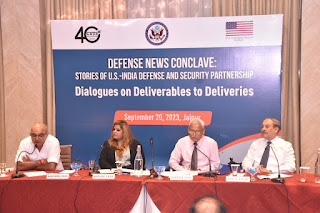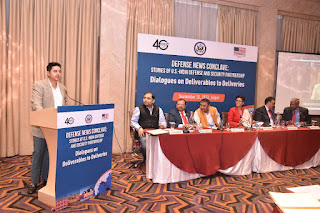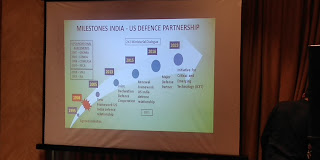U.S. Consulate Kolkata and CUTS International host "Defense News Conclave"
Media Kesari
Jaipur (Rajasthan)
Jaipur- The U.S. Consulate General Kolkata and CUTS International organized a day- long workshop titled "Defense News Conclave: Stories of U.S.-India Defense and Security Partnership," to inform the media that the bilateral defense relationship between the United States and India is strong and continues to grow.
More than 100 representatives from the media, think tanks, defense experts, defense industry leaders, and civil society participated in the hybrid event hosted in Jaipur, to focus on the positive messages highlighted by President Joe Biden and Prime Minister Narendra Modi in the recent joint statement which underscores that the U.S.- India partnership has evolved into a comprehensive global strategic relationship involving joint research, co-development and production of high-end defense equipment, and expanded cooperation in the Indo-Pacific region.
The workshop was spread across two sessions focused on disseminating good practices of the U.S.-India Defense and Security Partnership in general and its relevance in the Indo-Pacific region, in particular. Among others, it looked at the milestones set and achieved, and policies and gaps to be filled in to secure a free, open, inclusive, and prosperous Indo-Pacific region.
In the opening remarks Pradeep S Mehta, Secretary General, CUTS International said an enormous range of Americans have a stake in utilizing the full potential of U.S.- India defense ties as it spans the scope of human endeavor from sea to space, from security to health, and from energy to education. In a vision of India being a developed country by 2047, the U.S. is going to play a major role in it.
The U.S. and India have never been so interconnected whether it be through the information connection of the internet or global supply chains stated Col. Aaron J. Cooper, Air Attache, Embassy of the United States of America in India.
Both, the U.S. and India understand the significance of a free and open, connected, prosperous, secure, and resilient Indo-Pacific and both countries recognize that it is not possible for any one country alone to facilitate achieving these goals, Col. Cooper said. An important aspect of the U.S. Indo-Pacific Strategy is that this goal for the region cannot be achieved by one country alone.
Therefore, it is imperative that both the U.S. and India, the two major democracies in the world, along with other allies in the region, should work together towards achieving these goals, he added.
While discussing the theme of the first session, 'Scope of Bilateral Frameworks and Growing Areas of Convergence in U.S.-India Defense and Security Partnership', Lt. Gen. Subrata Saha (Retd.). former Member of the National Security Advisory Board and Deputy Chief of Army Staff said India and the USA created a wide range of strategic partnerships based on their values and beliefs. Both nations have similar principles of democratic rules, fighting against terrorism and the proliferation of mass destruction weapons.
Lt. Gen. Anil Kumar Ahuja (Retd.), former Deputy Chief of Integrated Defense Staff (Policy Planning and Force Development) and Indian Co-chair of the U.S.-India Defense Technology and Trade Initiative (DTTI) Inter Agency Task Force said that the U.S.-India initiative on Critical and Emerging Technology (ICET), to elevate and expand the strategic technology partnership and defense industrial cooperation between the countries provides the platform for achieving technological convergence.
Col. Manvendra Singh (Retd.) Editor-in-chief Defence and Security Alert, said the strategic relations between two countries- the U.S. and India come from philosophies and policies. It can't just be dependent on hard-core selling. It needs to come from inside. To ensure a stronger US-India relationship it is important that two countries start working towards joint Research and development of Equipment, and then work towards joint production and exports, Col. Singh added.
Speaking about the changing of the ecosystem induced by rapid technological pace, Lt. Gen. Arun Sahni (Retd.), Former General Officer Commanding in South Western Command Chief of the Indian Army said that there have been revolutionary changes in Intelligence, Surveillance and Reconnaissance (ISR). Algorithm warfare, Nano- technology, the relevance of lower orbit satellites, integrated kill chain, and hybrid firepower is the new era of warfare.
Prabudh Sharma, President, Raytheon India, and South Asia said that India enjoys the advantage of the availability of low-cost manpower. If an engineer charges USD 300 per hour in the U.S., an engineer in India will probably charge USD 30 per hour.
This makes the defense manufacturing sector attractive to investors.
Among the other distinguished speakers were Manjari Singh, Assistant Professor, Amity Institute of International Studies, Amity University, Nayanima Basu, Editor, Foreign Affairs, Strategy and National Security, ABP Live (ABP Network), Ritu Sharma, Senior Editor, The EurAsian Times; Maj. Gen. Sudhakar Jee (Retd.), Former member of Board and Vice President, L&T Defence and Consultant/Advisor, Defense and Aerospace; Cmde. Mukesh Bhargava (Retd.) Former Member of Board and Vice President, L&T Defence and Consultant/Advisor, Defence and Aerospace and Dipanjan R. Chowdhury, Diplomatic Editor, The Economic Times.
With its headquarters in Jaipur, India, CUTS International has regional centres in Accra, Lusaka and Nairobi covering West, Southern and East Africa. Besides them, it has centres in Hanoi, Geneva and Washington DC. In India, it has a regional centre in Kolkata, a rural development centre in Chittorgarh and a liaison office in New Delhi.










0 Comments